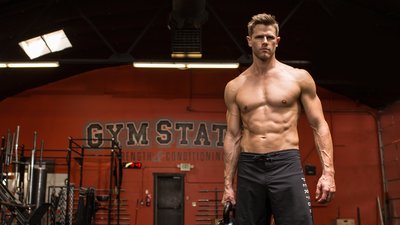If you're new to training, the gym can be an intimating place. But it doesn't have to be. Don't fumble around from machine to machine, copying exercises from the person next to you. And don't set out to gain 20 pounds of lean mass in a month, an unrealistic goal at best.
Instead, train smart. Learn how to make the most of your workout, set realistic goals, and avoid common beginner mistakes with advice from Performix athlete Andy Speer.
1. Setting Unachievable Goals
Instead of jumping in too quickly and going whole hog right off the bat, begin your fitness journey with a two-days-a-week training schedule. A few hours of gym time can be integrated into your life without much upheaval. Setting a goal you can make happen is a confidence booster, and any extra days you train are just gravy.
On days that you're pressed for time, focus on efficiency, to get the most out of a short session, rather than simply skipping the gym. Always plan for the unexpected by keeping a quick, 20-minute workout in your back pocket. Remember, the only bad workout is the one you didn't do.
Don't let limited equipment be an excuse, either. You can knock out a full-body workout with just a set of dumbbells and a few rounds of exercises. High-volume complexes are a great way to get in and out of the gym quickly, because they force you to complete a large amount of work in a short amount of time. A few rounds of 10 reps of dumbbell presses, bent-over rows, and reverse lunges with limited rest can be a great way to initiate muscle growth. Not sure which workouts to start with? Try some of Andy's favorites.
Once you hit your goal of training two days a week for three weeks, try adding another day to your schedule. Remember, there's no rush. Consistency and long-term habits—not short spurts of over-the-top workout—are what breed great results.
2. Failing to Plan
Ok, you made it to the gym. Great! But the work doesn't stop there. Walking around aimlessly or hopping on empty machines and hoping they target your problem areas is a waste of time.
You need a plan. Having a program written out will not only give you more confidence and help convince you that you know what you're doing in the gym, it also leads to better results.
It's important to know not only which exercise to do, but also how to perform it properly. Executing each move safely should be your top priority. Being a beginner doesn't mean you have to go through learning pains. Chest and back workouts, for example, should never put the health of your shoulders in jeopardy. Make sure each exercise builds the body part you're targeting while giving you a stronger, balanced, healthier physique overall.

Not sure where to start? Check out Bodybuilding.com for nutrition and fitness plans that match your level and goals.
3. Avoiding Strength Training
Another common mistake among beginners is jumping into cardio while bypassing high-quality movement patterns and strength training. If all you do is cardio and conditioning—especially when starting out—you'll burn a few calories, but you're not going to develop the muscle you want. Remember, lean mass consistently torches calories, even when your sweat session is over.

If you're new to the weight room and nervous about getting under the bar for compound movements such as deadlifts and squats, you have options. Tweaking traditional exercises by using equipment you find less daunting—like dumbbells, for instance—can be just as effective. Romanian deadlifts, high pulls, and chest presses can all be done that way. Plus, using dumbbells allows you to do unilateral (one-sided) exercises, allowing you to build balance and core strength.



